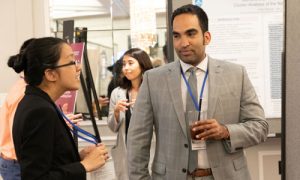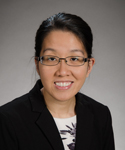
Dr. Jean Liew talks with Delamo Bekele, MBBS, an instructor of medicine at the Mayo Clinic, Rochester, Minn.
I had the opportunity to attend the Rheumatology Research Workshop in Washington, D.C., in June 2019. Held annually, this two-day meeting is run by the ACR Early Career Investigators (ECI) Subcommittee and is geared toward trainees at all levels (fellows, residents and medical students) and junior faculty with an interest in a rheumatology research career. The aim is to promote interaction and foster collaboration with established researchers. The meeting is much smaller and more intimate than the ACR/ARP Annual Meeting. I heard about this workshop during an ACR fellows-in-training (FIT) session and applied because I wanted to meet like-minded peers, as well as get advice from ECIs.
2 Sets of Talks
On the first day of the workshop, two sets of talks occurred simultaneously: one for trainees and another for junior faculty and advanced fellows. The trainee talks included such topics as turning your analysis into a project, applying for grants and searching for your first faculty position. I attended a mix of these talks and found important messages in each.
Some highlights:
- Liana Fraenkel, MD, MPH, professor of medicine at Yale University School of Medicine, New Haven, Conn., gave the keynote lecture in which she wove lots of advice into a narrative about her career path. Some of her pearls of wisdom included “Beware of mentors who don’t ask you to revise a lot” and “Learn to say no.” The one that resonated the most with me is that rejection is a normal, expected part of the process—“the smartest people you know have gotten rejected”—and that we learn to be better researchers from it.
- Maureen Dubreuil, MD, MSc, assistant professor of clinical epidemiology research and training at Boston University School of Medicine, spoke about preparing for a faculty position. She delved into the mythical “triple threat unicorn”—someone equally skilled at research, clinical care and teaching—and discussed realistic breakdowns of time (i.e., how to balance research [75%] with clinical care and teaching). She also discussed finding the balance between productivity that leads to funding and uncompensated work that may be gratifying. Teaching and giving talks may be fulfilling, but these activities don’t always come with financial compensation.
- In a talk geared to junior faculty, Bryant England, MD, assistant professor in the Department of Internal Medicine, Division of Rheumatology and Immunology, University of Nebraska Medical Center, Omaha, spoke about the period following the receipt of grant funding, advising the creation of a roadmap for action items. First comes celebration, but he cautioned that we need to think about next steps and how to keep things moving forward. As someone still knee-deep in the grant-writing process, it was helpful to have that insight.
Interspersed with the talks were small group sessions. In the Specific Aims group, we discussed the conventional structure of this important part of the grant application, and also received directed advice from ECIs on how to inject specific details about the research and its potential to get the reviewers excited.
Prior to the poster session, we presented our posters in small groups. This audience, also comprising peers and ECIs, provided feedback from their different areas of focus and levels of expertise. The larger poster session, with an adjoining reception (with heavy appetizers and cocktails), provided an opportunity to network in a cozier environment than the huge, jam-packed ACR/ARP Annual Meeting poster session.
Demystifying the NIH
On the second day, a morning session was devoted to National Institutes of Health (NIH) funding. Michael Ombrello, MD, PhD, head of the Translational Genetics and Genomics Unit of the National Institute of Arthritis and Musculoskeletal and Skin Diseases, opened with a talk demystifying the structure of the NIH and the pathway to independence (i.e., tenure track). The alphabet soup of grant funding was translated into plain English for the uninitiated. His talk was followed by a breakout question-and-answer session with NIH program officers. They provided a behind-the-scenes take on proposal fatal flaws and what goes on inside study sections.
Above all, the Rheumatology Research Workshop was a chance to meet like-minded peers at other institutions, as well as ECI role models. This was a Twitter-active meeting with its own hashtag, #RRW19, and I had the chance to meet mutual followers from this social media platform. When the sessions ended for the day, I had the opportunity to walk around Washington, D.C., and enjoy the summer sun (still a scarcity that time of year in Seattle), with plenty of breaks for ice cream and tourism.
2020 Workshop Applications Due Feb. 10
Applications to attend the 2020 Rheumatology Research Workshop, to be held in La Jolla, Calif., June 20–21, are due Feb. 10. The application requires an abstract for a research project, and trainees are eligible for a $500 travel scholarship. Abstracts detailing study design protocols, research in progress and preliminary results, in addition to completed studies, are eligible for consideration.
I encourage students, residents, fellows and junior faculty interested in integrating research into their career, whether it be basic science, translational or clinical, to attend.
 Jean Liew, MD (@rheum_cat), is a senior fellow and acting instructor in the Division of Rheumatology, University of Washington, Seattle.
Jean Liew, MD (@rheum_cat), is a senior fellow and acting instructor in the Division of Rheumatology, University of Washington, Seattle.

